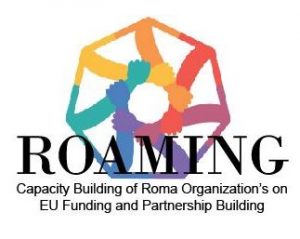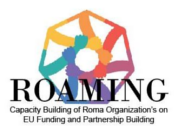“ROAMING “
Raising the capacity of Roma organizations to write EU projects and build partnerships

Why Roaming?
Roma civil society organizations in the Western Balkans do not have sufficient knowledge about existing EU funds and do not have the necessary capacity to apply for such funds, and therefore are not competent enough to manage them. Due to this situation, this organization, although the most experienced and most needed partners, do not initiate strategic partnerships, do not apply for EU funds and do not use them to advocate the resolution of recognized problems at the local, national and regional levels, although the European Commission and a large number of intergovernmental and international organizations often expresses concern over the unfavorable situation and difficult living conditions of the Roma population.
For this reason, the “Roaming” project is aimed at developing the capacity of Roma civil society organizations in the Western Balkans, with the aim of more efficient use of EU funds and acceptance of EU values and views, through quality initiatives and advocacy processes. Improving the capacity of Roma civil society organizations is necessary in order to support EU reforms, engage in the EU integration process, and become EU policymakers focused primarily on members of the Roma population.
Roaming Target Groups:
Target groups of this project are organizations that are part of SIMURGH of the Roma network – platforms of Roma civil society organizations established with the aim of empowering and advocating greater opportunities for employment of Roma population, promotion of innovative ways to combat anti-Gypsyism, re-examining leadership concepts in Roma communities and conducting open discussions on the migration of Roma in Europe.
This means that the direct beneficiaries of this project are Roma civil society organizations from the Western Balkans, which will develop and improve their capacities during its duration. These organizations are also partners in this project (6 of them) and from them are expected to include 40 other civil society organizations through the various planned activities in the project.
Partners are carefully selected in accordance with their experience and abilities. Out of the Box International will provide expertise when it comes to EU funding, advocacy process and partnership building, while six partners from the Balkans will provide the necessary expertise when it comes to Roma youth issues, insight into the current situation in each of the partner countries, but also selection of participants for various activities, and support for these participants throughout the duration of the project. In this way, partner organizations will acquire new experiences, knowledge and skills, which will also be the biggest profits they will achieve from this project. As an organization that applied for this project, the NGO Young Roma from Montenegro will ensure good governance and coordination within the consortium.
However, those who will benefit most from the planned activities are individuals, i.e. youth workers who will acquire useful knowledge about EU funds and the advocacy process. Given that the project will be open to all stakeholders, including policymakers and institutions at the European level, youth workers will have the opportunity to strengthen existing links, but also get involved in new European networks. European umbrella organizations will provide an opportunity for partner organizations to strengthen their potential through possible membership in given networks, and future joint projects and/or advocacy initiatives. On the other hand, European institutions dealing with youth policies and inclusive issues, such as the European Commission (Youth Unit), the Council of Europe, the partnership between the Council of Europe and the European Commission, and so on, will enable youth workers to acquire adequate knowledge and establish contacts during their internship in Brussels which will be useful to them in the future, especially when it comes to monitoring and evaluation processes.
The specific objectives of the project are:
- Capacity building of 6 Roma civil society organizations in the Western Balkans, needed to include these organizations in the process of applying, monitoring and writing EU project proposals, and more efficient fundraising for the 2017-2020 (EU Funding and Advocacy Training) ;
- Establishment of cooperation between 6 Roma civil society organizations in the Western Balkans and a number of relevant umbrella European organizations, and encouraging the representation of young Roma in Europe (Internship in Brussels envisaged for 6 youth workers);
- Education of 40 Roma civil society organizations in the Western Balkans with the aim of becoming more active in the process of advocating solving the problems of Roma youth at the local and national level (Laboratories for European Roma Initiatives and the Toolkit with recommendations).


